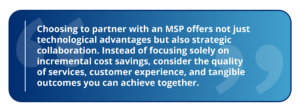Managed Network Services (MNS) have emerged as a pivotal strategy for organizations looking to streamline their network management without the fuss of micro-management. But what exactly does it mean?
How do Managed Network Services fit into modern business environments? With businesses becoming more digital-centric and networks more intricate, a robust and efficient network is paramount. Managed Network Services allow organizations to maintain network performance without stretching in-house resources too thin.
The Benefits of Managed Network Services
When exploring managed services in the ‘everything-as-a-service’ (XaaS) landscape, terms can become ambiguous. Is managed just another word for outsourcing? And does subscription have a straightforward definition? Throw these questions into a tech forum, and you will receive a symphony of responses.
The managed IT services sector has matured, becoming a dominant business model in the IT arena. Managed Service Providers now offer an extensive array of computing services to enterprises, with an estimated 88% of SMEs currently using or considering using an MSP and nearly 90% of Fortune 1000 companies relying on MSPs for a portion of their IT needs.
It’s impossible to deny the breadth of capabilities managed services offer, but the question remains: Why managed services?
At its foundation, cost-efficiency is a massive draw. Outsourcing often proves less costly than the exhaustive expenses of maintaining internal resources. Engaging a third-party vendor can more efficiently meet business objectives than establishing internal teams and infrastructure. And cost savings can be significant—the International Organization for Standardization reports that companies who use an MSP claim to achieve an average cost reduction of 15%.
In 2021, cost-saving briefly moved to the backseat, with standardization and efficiency of process taking the lead. In 2023, standardization remains one of the top motivators, only a single percentage point behind cost reduction. This suggests that while organizations independently managed their operations, they acknowledged the potential for better efficiency. Enter: Managed Service Providers (MSPs), the experts who refine processes and ensure operational consistency.
Finally, developing capabilities and driving business values, both concrete—like revenue and abstract—like brand perception, impact the decision to leverage MSP services. MSPs can impact these more abstract values by providing extra engagement and experience.
Choosing managed services offers unparalleled benefits for today’s businesses. Managed services are not just about delegating tasks; they’re about smart business strategy. Here’s the lowdown on why this is a strategic choice for many:
- Cost-Efficiency: Outsourcing network management means you’re no longer burdened with the costs of an extensive in-house IT team or constant hardware investments. The result? Notable cost reductions.
- Scalability and Flexibility: Business dynamics change, and so do network needs. As business demands shift, MNS scales accordingly, ensuring efficiency without needless expenditure.
- 24/7/365 Expertise: One standout advantage is the continuous access to highly-trained IT professionals. With Network Operation Centers (NOCs) running round-the-clock, any IT hiccup is addressed promptly. This means critical IT issues get immediate attention, minimizing potential downtimes.
- Security & Infrastructure: With MNS, you’re essentially fortifying your network defences. With continual firmware updates and advanced safeguards, your data and operations remain secure.
- Business Focus: With experts managing your network, you can redirect your energy to core business goals, comforted by the knowledge that professionals are handling your network needs.
- Tech Advantage: Keeping up can be daunting in the rapidly evolving tech landscape. But with the right MSP partner, you’re always a step ahead – ensuring you’re never left behind and capitalizing on the freshest tech solutions for your business.
When are Managed Network Services Right for Your Organization?
Choosing to partner with an MSP offers not just technological advantages but also strategic collaboration. Here’s when they can be the right fit for your organization:
- Venturing Beyond Traditional IT Operations: Instead of limiting yourself to the conventional scope of IT functions, expand your horizons to areas like innovation and automation. MSPs can introduce your organization to cutting-edge technologies and automated processes that may be beyond the capabilities of an in-house team.
- Mutual Investment with MSPs: Engage in a partnership where your organization and the MSP commit resources for mutual growth. This might involve collaborative learning, innovation-driven projects, or shared strategic centers dedicated to exploring new technology.
- Outcome-Oriented Approach: Instead of focusing solely on incremental cost savings, emphasize the quality of services, customer experience, and tangible outcomes. With an MSP, you can reorient your objectives towards enhancing the customer journey through digital transformations.
- Shared Performance Goals: To truly benefit from a partnership, your goals and those of your MSP should align. Consider collaborative structures that are tied to strategic performance metrics such as innovation speed, customer satisfaction levels, automation percentage, and other tangible outcomes.
- Holistic Process Integration: Rather than handling operations in isolated silos, look at the broader picture. With the aid of an MSP, your organization can transition to a unified operational strategy.
Managed Network Services are right for your organization when you’re ready to see beyond mere transactions and embrace transformative outcomes. Partnering with an MSP provides a collaborative approach to tackling challenges and seizing opportunities in the evolving digital landscape.
Selecting a Managed Network Services Provider
In 2022, the global managed services market was valued at $255.86 billion, and it’s forecasted to grow to $671.14 billion by 2030. Some estimates have the number of MSPs in the US alone at 40,000 providers. With so many options, how do you pick the right provider for your organization?
When contemplating the decision to partner with an MSP, consider the following factors to ensure a strategic and beneficial alignment:
☐ Network Size and Complexity:
Assess the size and intricacy of your current network.
- Evaluate if the network complexity necessitates specialized external management.
☐ Internal Skillset Assessment:
- Identify any expertise gaps within your in-house team.
- Determine if your provider has the necessary skills and experience to bridge these gaps.
☐ Budgetary Constraints:
- Evaluate your financial capability.
- Analyze the cost implications of managing in-house versus partnering with an MSP. Most partners offer a more cost-effective solution, especially for organizations with budgetary constraints.
☐ Strategic Growth Plans:
- Consider your organization’s long-term objectives: expansion, scaling, or a digital transformation.
- Assess if the MSP offers the flexibility and scalability required to meet these future demands.
☐ Outcome-Oriented Metrics:
- Shift focus from mere cost savings to tangible outcomes.
- Ensure the MSP emphasizes enhancing customer experience, quality of service, and other key performance outcomes.
☐ Collaborative Engagement:
- Examine the MSP’s willingness to co-invest in mutual growth endeavors.
- Determine if the MSP is open to a collaborative approach, ensuring mutual benefit and aligned growth trajectories.
☐ Co-Managed Solutions:
- Opt for a hybrid approach combining the autonomy of self-management with the expertise of an MSP.
- Ideal for making immediate, business-specific changes while having professional support for complex or critical implementations.
☐ Holistic Process Orientation:
- Check if the MSP promotes integrated operations instead of siloed approaches.
- The provider should offer unified strategies that ensure a consistent and efficient operational experience.
Conclusion
In today’s increasingly digital and interconnected business environment, managed services are an indispensable tool for organizations working to streamline operations without compromising performance.
For intricate, ever-evolving networks, MNS allows businesses to remain agile, secure, and efficient without overburdening in-house resources. Through a strategic partnership with a Managed Service Provider, companies can tap into a reservoir of expertise, enabling them to remain at the forefront of innovation while maintaining focus on core business objectives. Beyond “outsourcing” – choosing a partner for networking solutions signifies a forward-thinking approach, ensuring businesses are equipped with the tools to navigate challenges and harness opportunities in the digital age.
Whether you’re contemplating the leap into managed services or simply seeking to understand its value proposition better, your strategy is more than just an operational decision; it’s a transformative business move.


